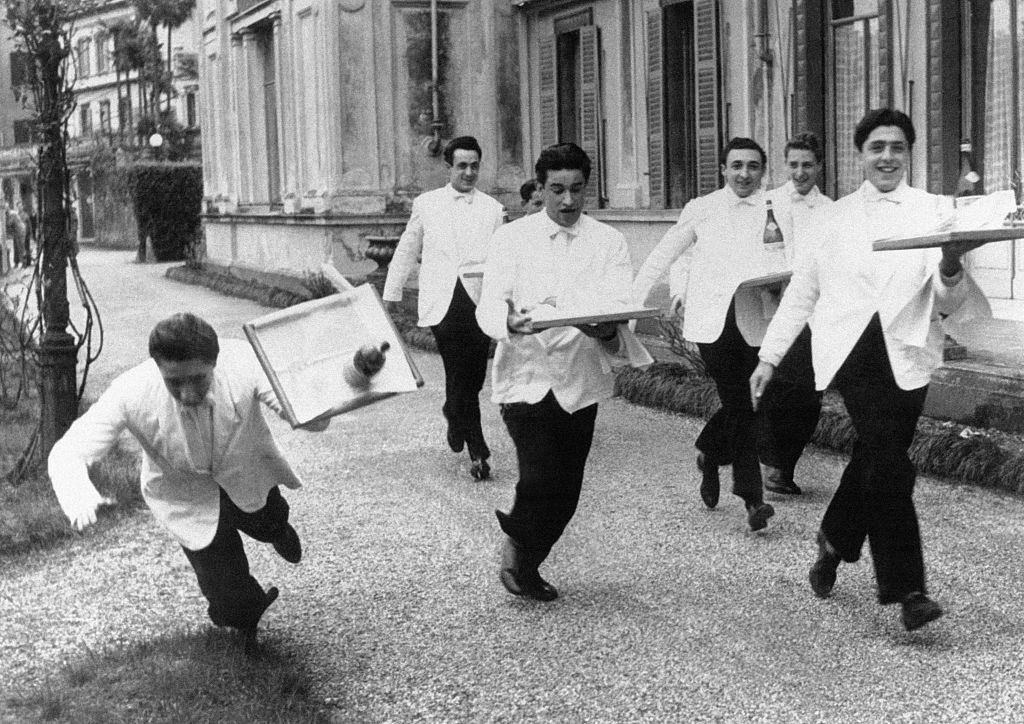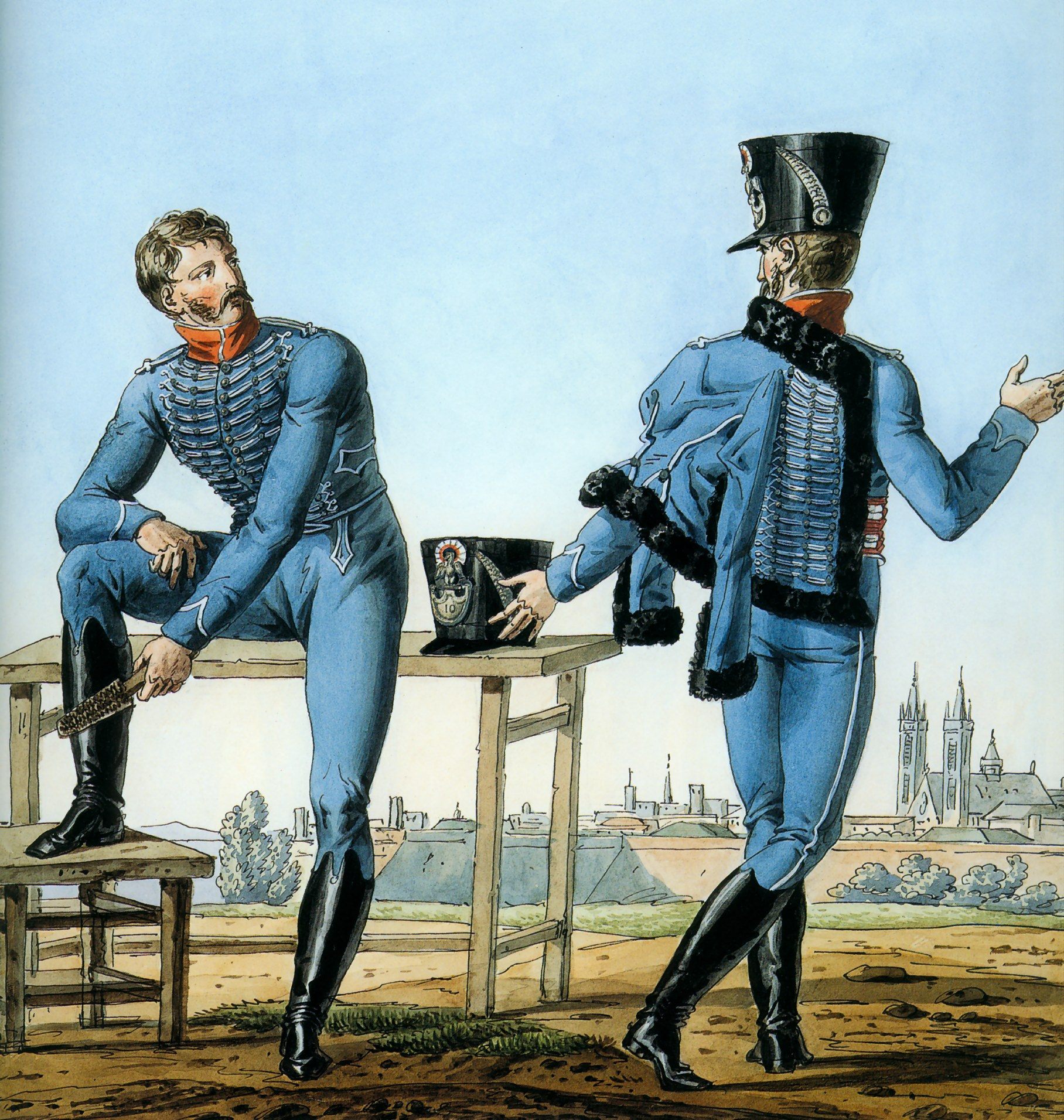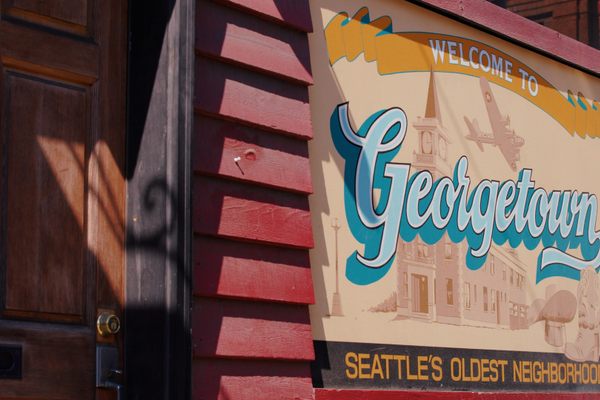The Great French Mustache Strike of 1907
Parisian waiters had to fight for the right to manly whiskers.

It’s April 1907. You’re an American in Paris, searching for a taste of real culture—maybe in the form of some fine French cuisine. You settle down in a quaint café, but before you can choose between the pissaladière and the pâté en croûte, a police officer approaches and asks you—not exactly politely—to leave. As he tells you to “Sortez!” he gestures at his mustached upper lip. You, clean-shaven, stagger off, confused and hungry.
Around the city at that time, high-end waiters were on strike to demand better pay, more time off—and the right to grow mustaches. The bristly adornments had been virtually ubiquitous among French men for decades, though many waiters, domestic servants, and priests were not allowed to have them—“sentenced to forced shaving,” as the newspaper La Lanterne put it on April 27. Indignant waiters, finally fed up, walked out of their fancy restaurants en masse, along with, by one contemporary estimate, roughly 25,000 francs a day in revenue. “Women are quite determined to starve with their children rather than see the whiskers of their husbands still fall under the razor,” reported the Mémorial de la Loire newspaper.
Those who stayed were treated as those considered scabs often are—berated by strikers who wanted them to join the movement. The police responded to the vocal agitators. According to a Los Angeles Times dispatch from April 20, the gendarmes were so heavy-handed in clearing out the strikers that they “expelled every smooth-shaven man including a dozen innocent Americans who had just arrived in town, ignorant of the strike, and who were bewildered by their hostile reception.”
Where mustaches ranked among their demands likely varied from waiter to waiter, but the uprising captivated France, where the mustache had made the man for generations. The country had, at last, been forced to confront a classist injustice that had long been festering right under its nose.

As La Lanterne reported then, in a history of the mustache, this form of facial hair had been a mark of privilege and status in Europe even back in antiquity, when Tacitus wrote that the Germans had reserved hairy upper lips for soldiers who distinguished themselves in battle. By the 19th century, the military mustache was in vogue once more, as armies throughout the continent sought to emulate the elite Hungarian “Hussar” cavalry. The Hussars fought in style—plumed helmets, leopard-skin-covered saddles, and strong, pronounced mustaches. The look, says beard historian Christopher Oldstone-Moore, “was the original form of shock and awe,” and by the middle of the 19th century most French soldiers had to wear mustaches (though some in the lower ranks, to reinforce military hierarchy, weren’t allowed to). The requirement was so strict that soldiers who couldn’t grow facial hair naturally had to stick on fakes. Eager to assert their own virility, the aristocracy and the bourgeoisie embraced the style, turning the mustache into a marker of the well-to-do Frenchman. It wasn’t Louis XIV’s clean-shaven, obsequious France anymore.
Around the same time, the first modern restaurants were rising around Paris. These establishments, primarily for the wealthy, sought to recreate the experience of dining in an upscale home. The experience was about more than food. Waiters had to retain the appearance of domestic valets, who were forbidden to wear mustaches as a sign of their rank. Diners were “paying to humiliate people in an almost institutional way,” says historian Gil Mihaely, who has published extensively on the subject of French masculinity. The clientele had “paid for an experience. And the experience was to be the master.”

The desire to regulate facial hair in France, Mihaely contends, has its roots in the era of colonialist expansion and the Industrial Revolution. Less wealthy people had acquired more access to what had traditionally been luxury goods, so the elite turned to something money couldn’t buy for a new means of projecting their status—even among those one-percenters who had no claim to the masculine military image. “Every puny whipster,” mocked The New York Times, “proclaimed himself with impunity a samurai by the hirsute adornments … ”
“It was very painful” for those who were forced to shave, Mihaely says. The mustache bans were especially demoralizing for veterans, who had to abandon proud symbols of their service just to qualify for certain jobs. To be denied the mustache was to be demeaned, infantilized, emasculated, even depatriated in front of their families, neighbors, and friends. Nothing paints a clearer picture of this than Guy de Maupassant’s 1883 short story, The Mustache, in which a woman named Jeanne mourns the mustache her husband has shaved in order to take on a female role in a play. “[A] man without a mustache is no longer a man,” she laments. Perhaps worse, he lacks “the insignia of our national character.”

Though the Parisian waiters had a union, says Mihaely, we don’t know precisely how many went on strike or precisely when. Contemporary news reports cite numbers ranging from the hundreds to the thousands, and suggest that strikers joined and left the movement in waves. The restaurant community is “not a factory,” Mihaely points out, and particular employer-employee disputes may have been resolved in their own ways.
We do know, however, that the striking waiters had vocal detractors who valued the social order and were concerned about the precedent being set. A scathing essay in Le Gaulois—a newspaper run by Arthur Meyer, a man on the wrong side of the Dreyfus Affair, another test of French identity—imagined that 10 years on, the waiters would strike once more, demanding this time the right to be clean-shaven like the upper classes (if they were to decide that to be the latest trend). The taunting implication, says Mihaely, was that class differences would endure changes in fashion. An even harsher piece, in the form of a poem in Gil Blas, bemoaned the fact that the waiters would be able to “hide easily their professions” after hours. The piece goes on to envision beers getting more expensive to balance the waiters’ better pay, and waiters laughing under their mustaches at customers foolish enough to pay the higher prices. Finally, it imagines that the upper-class patrons might one day go on strike themselves.
Still others argued against the movement due to hygienic concerns, which, according to Oldstone-Moore, were beginning to appear more frequently. “Will they clean rather frequently their mustache?” asked Le Journal on April 22. “From their nostrils to our drinks,” the paper warned, bacteria won’t need to travel far to “our stomach, kidneys, and our most delicate organs.” Plus, the article argued, the “hair appendix is not so convenient. It complicates life.” Watching a mustached man eat—certainly a common sight in the day’s restaurants, regardless of the appearance of the wait staff—“is repugnant to the viewer.”

But the waiters also had defenders, who joined them in challenging France to live up to its republican ideals. “These gentlemen will wear the mustache,” wrote an observer in L’Avenir. “I congratulate them and I find this conquest as fair as natural.” For La Presse, the movement was an expression of the Declaration of the Rights of Man and Citizen, and allowed the waiters “to finally show that they are men, free men, who have no more kings, who have no masters and who can wear at their ease this symbol of the all-powerful male, the mustache. Oh!” the paper proclaimed, “the beautiful independence!” The cause had even risen to Parliament, where Antide Boyer, the Socialist Deputy from Marseilles, proposed a bill making mustache bans illegal, on pain of up to three months’ imprisonment. (Boyer had actually introduced the bill before the strike began.)
Quoted in The New York Times, Boyer decried that “some misguided noblemen and presumptuous middle-class folk cling to the belief that they are honoring themselves by forbidding their servants, whom they treat as slaves, to wear mustaches.” Such a practice “under a democratic republic is grotesque and humiliating,” he said, a resurrection of “bygone tyranny contrary to the principles contained in the Declaration of the Rights of Man.”
The Boyer bill failed, but it ultimately wasn’t needed. By early May, waiters across the city had won the right to wear mustaches—some of them, says Mihaely, at the expense of their other demands. Those concessions, to some degree, invited the ire of left-wing activists, who had supported the strike but thought it absurd to prioritize a symbolic victory over material gain. Perhaps the waiters got hoodwinked, or perhaps, suggests Mihaely, their strike was only partly about labor, and as much about belonging, self-definition, and identity.





















Follow us on Twitter to get the latest on the world's hidden wonders.
Like us on Facebook to get the latest on the world's hidden wonders.
Follow us on Twitter Like us on Facebook